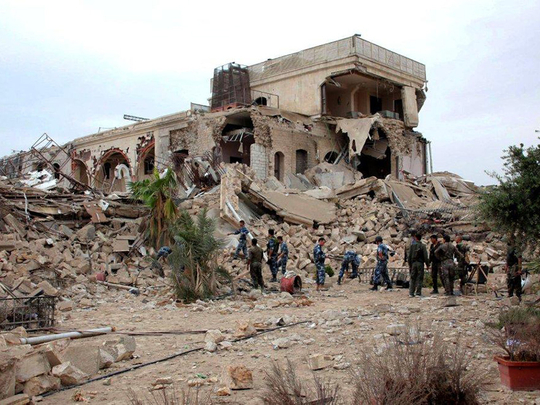
Whatever Amnesty International’s opinion of the performance of the United Nations’ Security Council over the years, the latter remains imminently relevant despite its many shortfalls over the past seven decades, particularly the use of its most effective weapon — the power of veto.
But Amnesty is, at the same time, right to come heavy on the Security Council and criticise the highest international authority when it comes to matters of world order, nature and human rights issues.
Therefore, the latest call by Amnesty to the five permanent members of the UN Security Council to give up their veto powers in cases where atrocities are being heavily committed is both timely and valid — now more than ever.
One major fact the vast majority agrees to: The atrocities around the world since 2011 are of catastrophic dimensions and of total shame and the outlook for this year is bleaker and many times bloodier.
It is right for Amnesty International to call the world’s top countries in its annual report to play a responsible role in protecting civilians by simply using the power they have been freely, and often selfishly, enjoying since the end of the Second World War.
Clash of interests
Amnesty is clearly accusing the council’s five permanent members — the US, China, France, Russia and the UK — of using their veto power to “promote their political or geopolitical self-interest above the interest of protecting civilians”.
Obviously there is an ongoing problem, at the heart of which lies the notion of ‘clash of interests’.
On the one hand, the main task of the permanent members is to possibly prevent crises before they happen or on the other hand, quickly stop them after they erupt. But unfortunately, this is seldom the case.
Last year alone, the veto was only used twice and in both cases the interests of the veto’s holders were directly the target, not the victims’ interests.
Last March, Russia vetoed a resolution condemning as “illegal” a referendum on the status of Crimea. Worse still, Russia and China jointly combined to block in May a resolution condemning Syria for the atrocities committed by the country’s regime.
Meanwhile, many draft resolutions proposing tough action to deal with bloody crises, particularly in Syria, have miserably failed to reach voting stage, that is, they were dead before being born because they would most certainly be vetoed by one or more of the big five.
It has already been internationally documented that the world is currently going through the worst refugee crises in its history, with four million Syrians displaced by war and many thousands of migrants wastefully dying in the Mediterranean.
According to the latest counts in Syria, 75 per cent of the population lives in poverty, 50 per cent lives in extreme poverty and only 46 per cent of the entire Syrian population is able to work and generate income.
Furthermore, more than 50 per cent of the country’s children are not in school. It is shockingly unprecedented for a country since the Second World War, to regress very quickly in such a short time from second world rank to a third world one. At least two generations will greatly miss out on social and economic development if these ghastly killings do not promptly stop.
Moreover, the latest Russian veto confirms Moscow as the first offender of its power in the Security Council in this respect in the history of the UN, with 115 vetoes between 1972 and 1997 alone.
The US is responsible for 69 vetoes during the same period — almost half of them (32) were cast to shield Israel from draft resolutions. Washington used its first ever veto in the Security Council in March 1970 when Henry Kissinger was US president Richard Nixon’s national security adviser.
It was intended to protect an ally and fellow permanent member, Britain, which was under Security Council pressure to end the white minority government in Southern Rhodesia (present-day Zimbabwe). However, in 1989-1990, Washington reconsidered its policy of shielding Israel in the Security Council when the senior Bush’s administration realised it was necessary to maintain unity in the Council to face up to Iraq’s invasion of Kuwait in August 1990.
Brief surrender of rights
However, part of the solution that Amnesty is suggesting would be for those permanent members to briefly surrender their Security Council veto on issues related to mass killings and genocides as is currently the case in Syria.
The UN, the US and the rich countries of Europe have most certainly let down the desperate in times of drastic need. Amnesty said the efforts of wealthy countries to keep refugees out have taken “precedence over their efforts to keep people alive”.
Hence the argument continues that if there were restraints on the use of the veto power by members of the Security Council, the UN would have been able to unblock the much-needed action to prevent violence and stop atrocities in Syria.
Additionally, this would have made it potentially possible for President Bashar Al Assad to be referred to the International Criminal Court, as well as provide the badly needed access for desperately needed humanitarian aid to reach civilians in the country.
Mustapha Karkouti is a former president of the Foreign Press Association, London.











